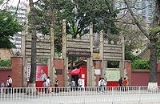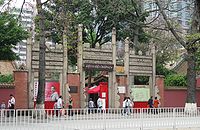
Guangzhou Peasant Movement Institute
Encyclopedia

Guangzhou
Guangzhou , known historically as Canton or Kwangchow, is the capital and largest city of the Guangdong province in the People's Republic of China. Located in southern China on the Pearl River, about north-northwest of Hong Kong, Guangzhou is a key national transportation hub and trading port...
, also called PMTI was set up in a 14th century Confucian temple and now the site on Zhongshan Road
Zhongshan Road
Zhongshan, Jhongshan or Chung Shan is a common name of Chinese roads, usually in honour of Sun Yat-sen, better-known in Chinese as "Sun Zhongshan", who is considered by many to be the "Father of modern China"....
commemorates Guangzhou’s revolutionary past.
History
The PMTI was one of the outcomes of the First United Front between the KuomintangKuomintang
The Kuomintang of China , sometimes romanized as Guomindang via the Pinyin transcription system or GMD for short, and translated as the Chinese Nationalist Party is a founding and ruling political party of the Republic of China . Its guiding ideology is the Three Principles of the People, espoused...
(KMT or Nationalist Party) and the Chinese Communist Party (CCP
CCP
- Politics :* Canadian Conservative Party, majority government* Chinese Communist Party, the ruling political party in the People's Republic of China* Confederación Campesina del Perú, a peasant organization in Peru- Other :...
) during early-mid 1920s. In 1923, the KMT-CCP Alliance had been formed. The KMT was then led by Sun Yat-sen
Sun Yat-sen
Sun Yat-sen was a Chinese doctor, revolutionary and political leader. As the foremost pioneer of Nationalist China, Sun is frequently referred to as the "Father of the Nation" , a view agreed upon by both the People's Republic of China and the Republic of China...
and carried out the policies of “alliance with Soviet Russia, cooperation with the Communists, and assistance to peasant and worker movements”. In 1924, Peng Pai
Peng Pai
Peng Pai born in Haifeng County , Guangdong Province, China, was a pioneerIn the Preface, the author called Peng Pai "the father of Chinese rural communism"...
(彭湃), one of the leaders of the CCP at its early stage, became a member of KMT and served as the Secretary of Peasant Department of KMT Central Committee. Based on Peng Pai
Peng Pai
Peng Pai born in Haifeng County , Guangdong Province, China, was a pioneerIn the Preface, the author called Peng Pai "the father of Chinese rural communism"...
’s idea and suggestion, the KMT Central Committee decided to set up the institute to train young idealists from all over China who then went out to educate the masses in rural China. The decision to establish the PMTI was historic, in that it was the first formal government-sponsored training institute for rural political activities. The institute was officially opened on July 3, 1924, in Guangzhou (Canton) in Huizhou Association headquarters (惠州会馆) at 53 Yue-Xiu-Nan-Lu (越秀南路), with Peng Pai as Director. Between July 1924 and September 1926, there were totally 6 classes or terms held in the PMTI. Peng Pai was the Director for 1st and 5th terms, and Mao Zedong
Mao Zedong
Mao Zedong, also transliterated as Mao Tse-tung , and commonly referred to as Chairman Mao , was a Chinese Communist revolutionary, guerrilla warfare strategist, Marxist political philosopher, and leader of the Chinese Revolution...
was the Director for 6th term or class with the largest size. Luo Yiyuan (罗绮园), Yuan Xiaoxian (阮啸仙), and Tan Zhitang (谭植棠) were Directors for 2nd, 3rd, and 4th terms, respectively. Some of the famous figures in the CCP lectured here, including Zhou Enlai
Zhou Enlai
Zhou Enlai was the first Premier of the People's Republic of China, serving from October 1949 until his death in January 1976...
, Yun Daiying (恽代英), and Xiao Chu-nv (萧楚女) .
The institute was closed in 1926 as the relationship between the Nationalists and Communists disintegrated. Many former students were killed during the failed 1927 uprising and are remembered in the Martyrs Memorial Park.
The Peasant Movement Training Institute was opened as a commemorative site in the 1950s and the lecture rooms and dormitories of the young revolutionaries have been recreated.

